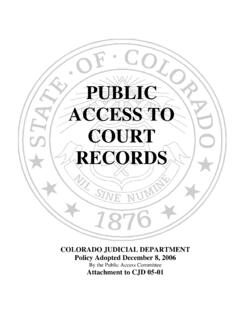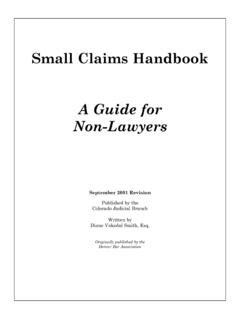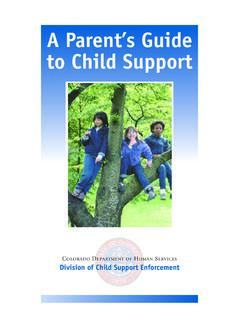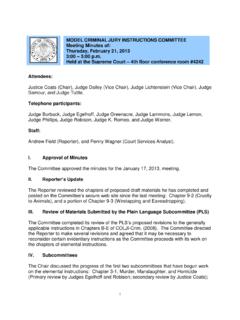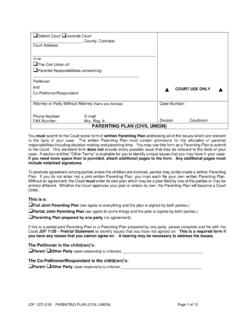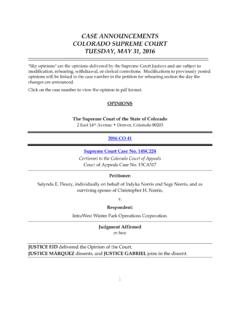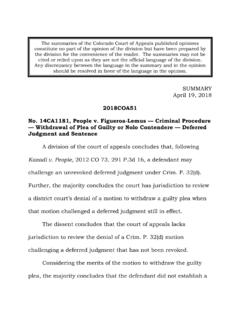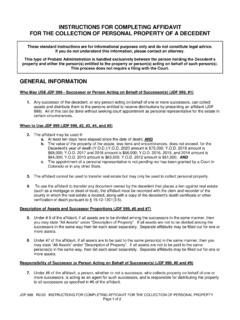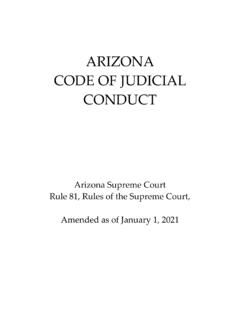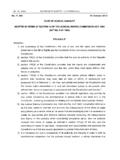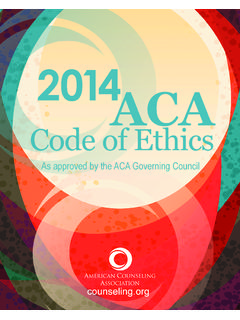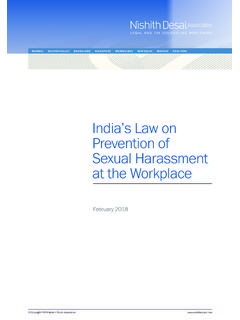Transcription of Code of Judicial Conduct - Colorado Judicial Branch
1 Colorado code OF Judicial Conduct JULY 1, 2010 preamble [1] An independent, fair and impartial judiciary is indispensable to our system of justice. The United States legal system is based upon the principle that an independent, impartial, and competent judiciary, composed of men and women of integrity, will interpret and apply the law that governs our society. Thus, the judiciary plays a central role in preserving the principles of justice and the rule of law. Inherent in all the Rules contained in this code are the precepts that judges, individually and collectively, must respect and honor the Judicial office as a public trust and strive to maintain and enhance confidence in the legal system.
2 [2] Judges should maintain the dignity of Judicial office at all times, and avoid both impropriety and the appearance of impropriety in their professional and personal lives. They should aspire at all times to Conduct that ensures the greatest possible public confidence in their independence, impartiality, integrity, and competence. [3] The Colorado code of Judicial Conduct establishes standards for the ethical Conduct of judges and Judicial candidates. It is not intended as an exhaustive guide for the Conduct of judges and Judicial candidates, who are governed in their Judicial and personal Conduct by general ethical standards as well as by the code . The code is intended, however, to provide guidance and assist judges in maintaining the highest standards of Judicial and personal Conduct , and to provide a basis for regulating their Conduct through disciplinary agencies.
3 Scope [1] The Colorado code of Judicial Conduct consists of four Canons, numbered Rules under each Canon, and Comments that generally follow and explain each Rule. Scope and Terminology sections provide additional guidance in interpreting and applying the code . An Application section establishes when the various Rules apply to a judge or Judicial candidate. [2] The Canons state overarching principles of Judicial ethics that all judges must observe. Although a judge may be disciplined only for violating a Rule, the Canons provide important guidance in interpreting the Rules. Where a Rule contains a permissive term, such as may or should, the Conduct being addressed is committed to the personal and professional discretion of the judge or candidate in question, and no disciplinary action should be taken for action or inaction within the bounds of such discretion.
4 [3] The Comments that accompany the Rules serve two functions. First, they provide guidance regarding the purpose, meaning, and proper application of the Rules. They contain explanatory material and, in some instances, provide examples of permitted or prohibited Conduct . Comments neither add to nor subtract from the binding obligations set forth in the Rules. Therefore, 2when a Comment contains the term must, it does not mean that the Comment itself is binding or enforceable; it signifies that the Rule in question, properly understood, is obligatory as to the Conduct at issue. [4] Second, the Comments identify aspirational goals for judges. To implement fully the principles of this code as articulated in the Canons, judges should strive to exceed the standards of Conduct established by the Rules, holding themselves to the highest ethical standards and seeking to achieve those aspirational goals, thereby enhancing the dignity of the Judicial office.
5 [5] The Rules of the Colorado code of Judicial Conduct are rules of reason that should be applied consistent with constitutional requirements, statutes, other court rules, and decisional law, and with due regard for all relevant circumstances. The Rules should not be interpreted to impinge upon the essential independence of judges in making Judicial decisions. [6] Although the black letter of the Rules is binding and enforceable, it is not contemplated that every transgression will result in the imposition of discipline. Whether discipline should be imposed should be determined through a reasonable and reasoned application of the Rules, and should depend upon factors such as the seriousness of the transgression, the facts and circumstances that existed at the time of the transgression, the extent of any pattern of improper activity, whether there have been previous violations, and the effect of the improper activity upon the Judicial system or others.
6 [7] The code is not designed or intended as a basis for civil or criminal liability. Neither is it intended to be the basis for litigants to seek collateral remedies against each other. ANNOTATION By expressing approval of the canons of ethics, the supreme court did not enact them into law. In re Petition of Colo. Bar Ass n, 137 Colo. 357, 325 932 (1958). Nevertheless, they are recognized as principles of exemplary Conduct . Although the canons employing language of wide coverage cannot be given the effect of law, they nevertheless are recognized generally as a system of principles of exemplary Conduct and character. In re Petition of the Colo. Bar Ass n, 137 Colo.
7 357, 325 932 (1958). Neither the supreme court nor the grievance committee has the power or authority to institute or Conduct disciplinary proceedings of any kind involving the Conduct of a duly elected judge, he being responsible solely to the people, the constitution fixing the remedy at impeachment. In re Petition of Colo. Bas Ass n, 137 Colo. 357, 325 932 (1958). 3 Terminology The first time any term listed below is used in a Rule in its defined sense, it is followed by an asterisk (*). Appropriate authority means the authority having responsibility for initiation of disciplinary process in connection with the violation to be reported.
8 In Colorado , the Commission on Judicial Discipline is the authority responsible for investigating Judicial misconduct and disciplining judges, except with respect to Denver County court and municipal judges, over whom it has no jurisdiction pursuant to Colo. Const. Article VI 26; 13-10-105, ; 4(a). See Rules , and Contribution means both financial and in-kind contributions, such as goods, professional or volunteer services, advertising, and other types of assistance which, if obtained by the recipient otherwise, would require a financial expenditure. See Rule De minimis, in the context of interests pertaining to disqualification of a judge, means an insignificant interest that could not raise a reasonable question regarding the judge s impartiality.
9 See Rule Domestic partner means a person with whom another person maintains household and an intimate relationship, other than a person to whom he or she is legally married. See Rules , , and Economic interest means ownership of more than a one percent legal or equitable interest in a party, or a legal or equitable interest in a party of a fair market value exceeding $5,000, or a relationship as director, advisor, or other active participant in the affairs of a party, except that: (1) Ownership in a mutual or common investment fund that holds securities, or of securities held in a managed fund, is not an economic interest in such securities unless the judge participates in the management of the fund.
10 (2) securities held by an educational, religious, charitable, fraternal, or civic organization in which the judge or the judge s spouse, domestic partner, parent, or child serves as a director, an officer, an advisor, or other participant is not an economic interest in securities held by the organization; (3) the proprietary interest of a policy holder in a mutual insurance company, of a depositer in a financial institution, or deposits or proprietary interests the judge may maintain as a member of a mutual savings association or credit union, or a similar proprietary interest is an economic interest in the organization only if the outcome of the proceeding could substantially affect the value of the interest; and (4) ownership of government securities is an economic interest in the issuer only if the outcome of the proceeding could substantially affect the value of the securities.
